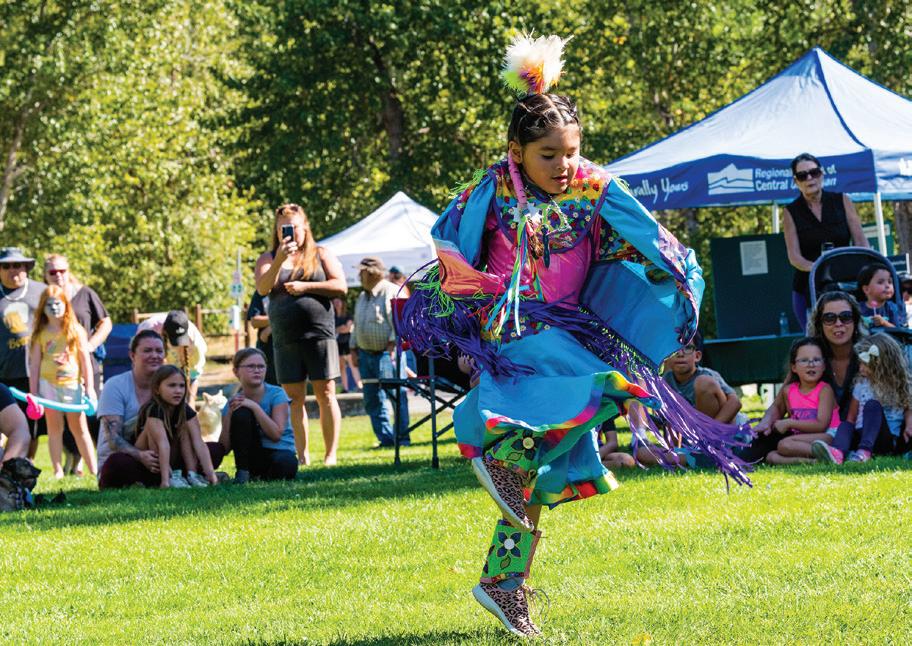
7 minute read
Environment
We will initiate and support efforts to reduce our environmental footprint, adapt to climate change and connect with nature.
In collaboration with others, the RDCO will develop the strategies, plans and actions to protect our watersheds, care for our lakes and maintain foreshore areas. We also work with partners and other levels of government to manage our solid wastes, address dangers from flooding and wildfires and enhance our region’s ecosystems.
Keeping our air clean
Since 1999, the Central Okanagan Air Quality Program has offered programs and services to help protect and improve the region’s air through education, awareness, and pollution prevention.
One of the primary contributors to air pollution has been through open burning. Great strides have been made by the air quality program in conjunction with agricultural producers and large property owners to provide them with reliable alternatives. In 2022 the Regional Board committed an additional $40,000 a year to the Agricultural Chipping program to provide more opportunities for growers. This helped clear more than 30 hectares of land on ten orchards without burning. In addition, the Mow-Chip-Rent-it rebate program added a buy-it component along with new and higher rebates to help farmers and residents manage small volumes of wood waste as an alternative to burning. Using this program, Central Okanagan residents were able to reduce the fire hazard fuels on 35 hectares preventing 24 wood piles from being burned.
The former Wood stove exchange program, now known as the Community wood smoke reduction program, offers rebates of up to $1,500 for Central Okanagan residents that recycle an old wood burning appliance with newer, cleaner burning technology. There are six participating Central Okanagan retailers that will recycle your old wood burner and handle all the necessary paperwork for the applicable rebate.
While 2022 marked the final year that propane and natural gas stoves/inserts were eligible for rebates because they burn fossil fuels, produce carbon emissions, and contribute to climate change and greenhouse gases, the program added rebates for those upgrading outdoor wood boilers to the program along with increased incentives for Westbank First Nation members.
Improving indoor air quality for residents has also been supported by the air quality program. In partnership with Take Action on Radon, over 300 individual homes participated in radon testing to determine the level of the odourless, colourless gas identified as a cause of lung cancer. In fall 2021, they picked up and placed a free radon gas detector in their home, returning it after 90 days for lab analysis. In spring 2022, each received a confidential result with recommendations for possible mitigation.
We continue to look for innovative options for residents to protect our air quality on behalf of our partners with the cities of Kelowna and West Kelowna, districts of Lake Country and Peachland, Westbank First Nation and the Central Okanagan East and Central Okanagan West electoral areas.
We’re connecting with nature
It’s no secret that the Central Okanagan has one of the best regional parks systems anywhere.
And with the easing of pandemic restrictions and gatherings, increasing numbers of residents are again embracing their connection with our natural environment – one of the priorities of the Regional Board. Our parks Visitor Services team loves to share their love of all aspects of our landscape by encouraging passive recreation and education about nature in our regional parks.
During 2022, more than 36,000 people took part in over 700 activities, events or interpretative programs, well on the way to the 43,000 participants before the pandemic. These programs were spread across the Central Okanagan in 27 of our regional parks. The largest by far were the annual Spooktacular pumpkin walk and kikinee festival, filling the parking lots at Mission Creek Regional Park. We also ventured out into new territory offering programs in French and Spanish languages and added Winter Wonder Night Walks to our wide-ranging guided interpretative outings to encourage participants to explore the natural surroundings, unique environment, and diverse ecosystems across our regional parks.
Speaking of diversity, many of our programs honour and respect the history, culture and traditions of the syilx / Okanagan people as we supported Indigenous-led understanding including syilix land tours in Goat’s Peak and Rose Valley regional parks, drum circle programs, and booths and cultural presentations at the kikinee festival. To further our strong ongoing relationship with the Okanagan people and encourage and support their language, we partnered with an apprentice Knowledge keeper and speaker to develop a guide to common animals and plants in English and nsyilxc n. This language has been alive since time immemorial and is deeply rooted in these sacred (land). We further expanded this to include links to online audio clips to help with pronunciation. Find that and learn more about these partnerships by visiting rdco.com/parks
Our friends with CRIS, the Community Recreation Initiative Society, continue to join many of our in-park programs. Its volunteers share the love of the outdoors and remain committed to making parks and trails accessible for all. And for those older citizens who are not as mobile, we continue to take our park interpretation to them, connecting with care homes through the outdoor
Great Canadian Trivia Challenge and in residence ‘Nature Nuggets’ programs. With the support of the Kelowna Community Resources Hub, we are able to connect with low income and immigrant families. For our younger residents who have a lifetime ahead of them, our school-based field trips continue to rebound, seeing almost 11,800 students participating in more than 470 programs.
In 2022, our beloved volunteers contributed more than 1,000 hours of their time to park improvement and upgrade projects. They too show their dedication, love and passion for protecting and enhancing our park surroundings with their selfless efforts. Many of these efforts including fundraising are provided by our various ‘Friends of’ societies to whom we remain ever grateful.
For those who have engaged in sharing our love of the natural world around us – Thank-you! It’s our hope we’ll see everyone active and outdoors in the year ahead.
Reducing, reusing, repurposing, recycling
In 2022, more than 8,118 tonnes of recyclables were picked up and emptied from blue lid recycling carts left at the curb across the Central Okanagan. Another 1,197 tonnes were dropped off at the four RDCO waste transfer facilities in Kelowna at the Glenmore landfill, West Kelowna, Traders Cove and North Westside.
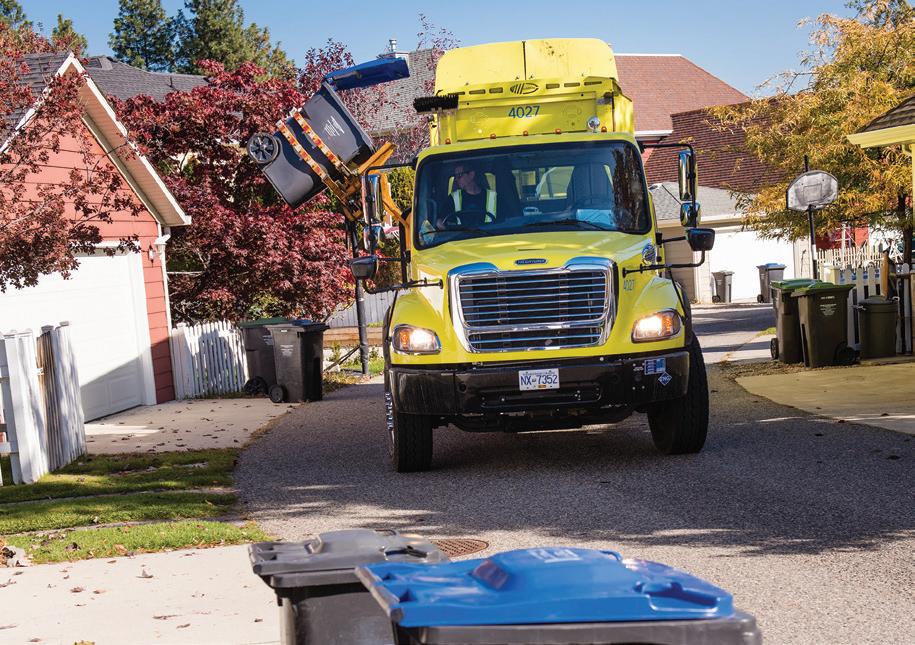
There’s a definite desire by residents to do the right thing for our environment, by either reducing consumption, reusing and repurposing materials when possible and finally recycling. While the desire is there, sometimes what’s known as wish-cycling gets in the way of placing the right recyclable material in the right location. Recycle BC waste audits have indicated unacceptable contamination rates, resulting in financial penalties for some participating local governments.
The Regional Waste Reduction Office continues to mount direct education efforts to help residents understand how to recycle properly, through traditional and social media. At the street level, our Recycling Ambassadors continue to check curbside recycling carts in areas across the region for materials that shouldn’t be placed inside.
Recycling information stickers are placed on carts to help residents understand the do’s and don’ts to help reduce recycling confusion and costly contamination.
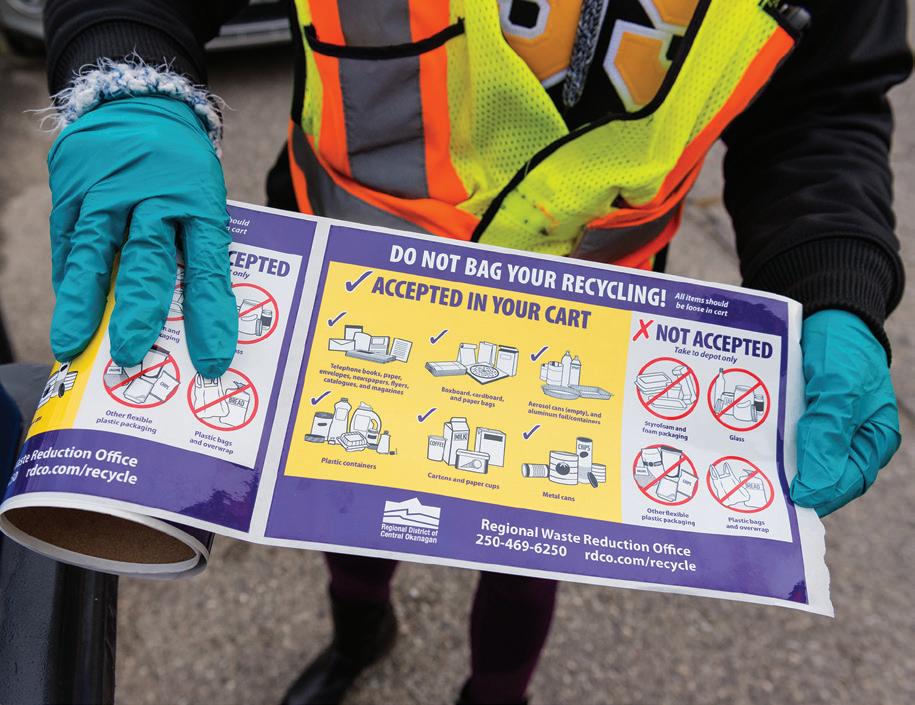
To further help residents we hosted a series of innovative pop-up recycling depots in Peachland and Lake Country. These one-day events provided an opportunity for recycling material drop-off in their community, taking the depot to them. They also were able to connect one-on-one with Waste Reduction Office staff who answered any questions and raised recycling awareness.
Our popular subsidized composter sale was another sell-out, with 300 Earth Machine units snapped up by residents across the region. Composting has been shown to cut household garbage in half, while providing a nutrient-rich, soil enhancer for use on lawns and gardens.
As COVID restrictions eased, we also hosted our popular Trunk Sales in the spring and the final one in late September. Over the past 18 years, each of these mega garage sales brought together 150 individual sellers in one location to help repurpose items that otherwise might be destined for the landfill.
Curbside recycling
8,118 metric tonnes collected
We launched a four-month recycling awareness campaign during the year, providing toolkits and information specifically for residents and property managers of multi-family buildings like apartments, condos and strata properties which often received private recycling services. This program also saw 27 on-site visits including offering suggestions for revamping recycling areas and workshops in these facilities to better manage recycling efforts. Information is available online at rdco.com/multifamily.
This effort will continue in 2023 along with extensive opportunities to consult with residents as we investigate a made in the Central Okanagan vision for a possible curbside organics collection. And we’ll continue to work with our local government partners as we transition and transfer recycling collection to RecycleBC in 2026.
Award for flood mitigation strategy
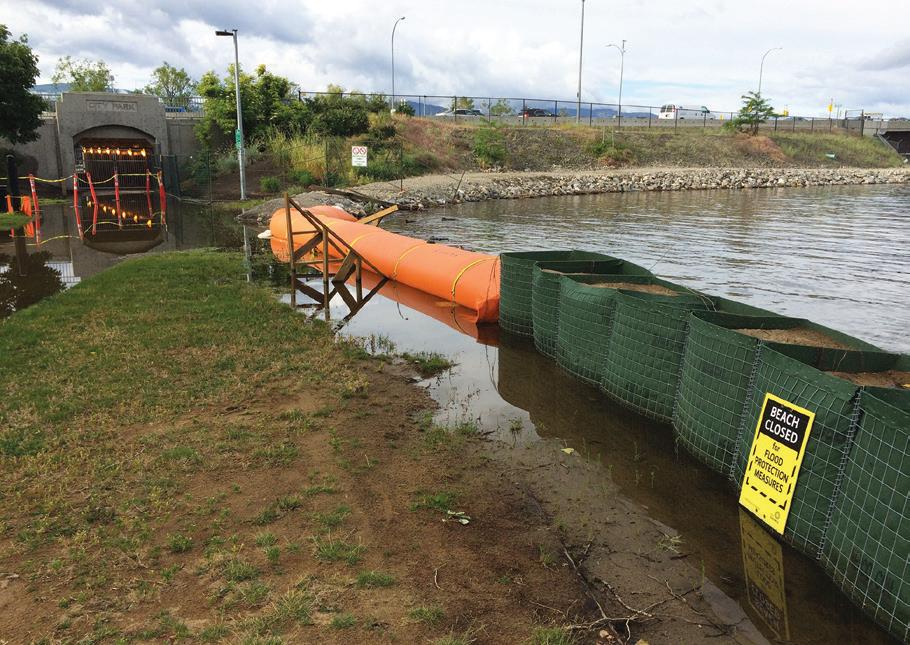
People whose homes are inundated or damaged by floods will remember for the rest of their lives; landscapes are changed forever; regional and national economies suffer. With climate change driving up the frequency and intensity of flooding and other natural hazards, the risks and impacts to Canada’s economic vitality, infrastructure, environment, and citizens will only continue to grow. The Central Okanagan is no stranger to flood damages, having experienced them on our rivers and lakes in recent years.
This is why for many years, the Regional District has actively collaborated with First Nation and local governments and other regional partners to raise awareness and broaden understanding about local flood hazards and the impact of climate change. This work, along with recent damaging floods have highlighted the need for new approaches in flood management.
One area these efforts focussed on is the creation of a regional flood mitigation strategy as part of the on-going and larger development of a Floodplain Management Plan for the region.
Local governments across the province have seen firsthand the wicked effects of natural disasters, from flooding to fires. Recent experiences have been a testament to the power of nature and climate change. The regional floodplain management plan and resource guide is a demonstration of collaboration in action. With input from local governments, the public and syilx / Okanagan communities – the traditional stewards of these lands for thousands of years - we aim to reduce risk and increase resiliency in years to come.
The plan and mitigation strategy were born out of a need to reduce our flood risks while increasing our resilience. From initially identifying high risk areas, to developing hazard maps and non-structural flood mitigation strategies, this project provides a consistent framework for Central Okanagan jurisdictions to consider in mitigating and preparing for the ever-present flood threat.
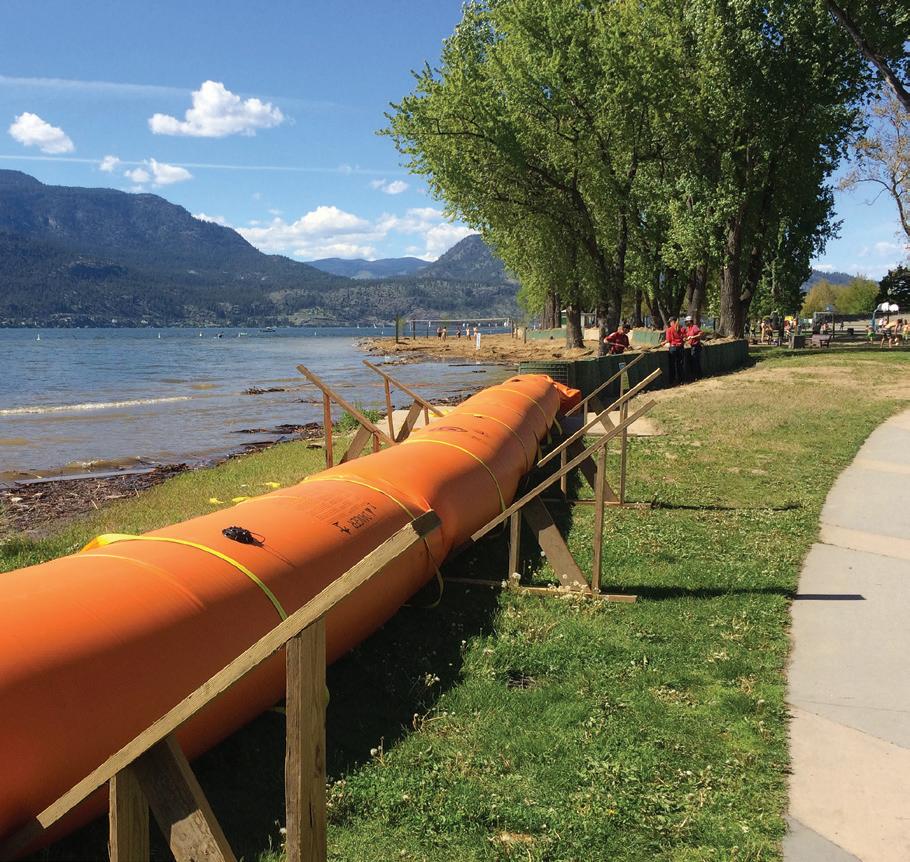
The work on the strategy was recognized by the Southern Interior Local Government Association (SILGA), which presented its Community Excellence Award for Environmental Sustainability to the Regional District during the annual conference in Salmon Arm in spring 2022.
To view the flood mitigation strategy and floodplain management plan toolkit and resource guide visit rdco.com.









